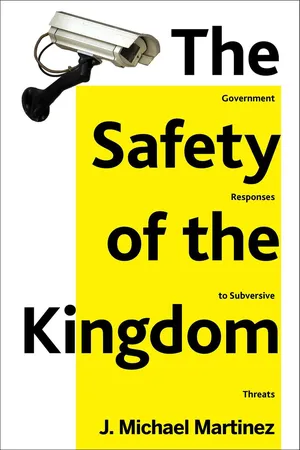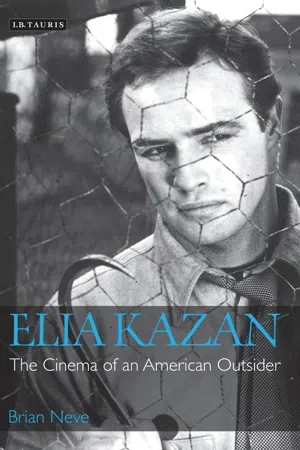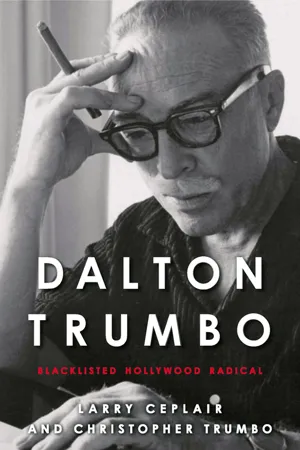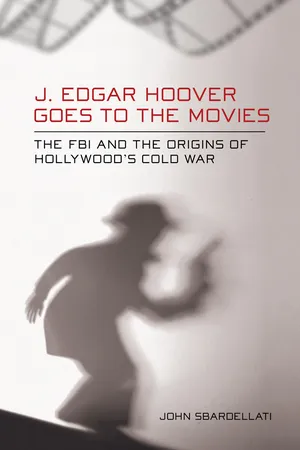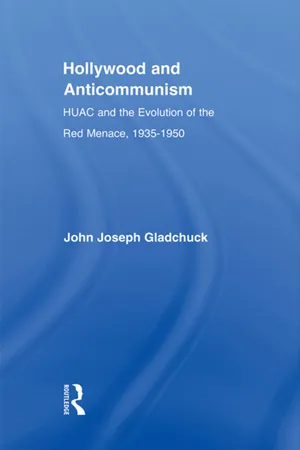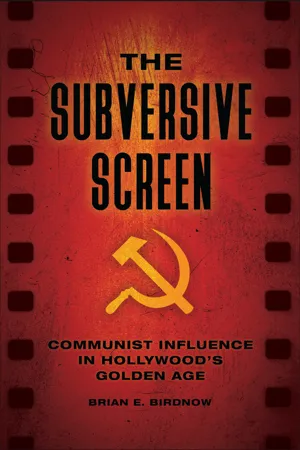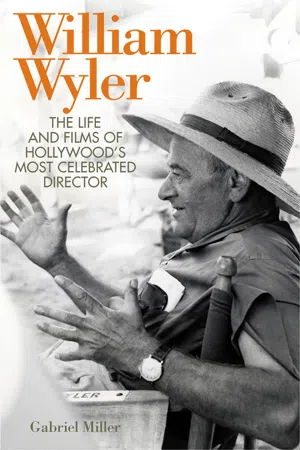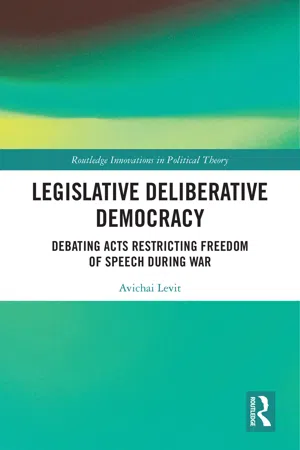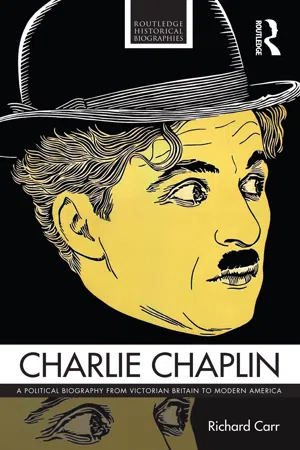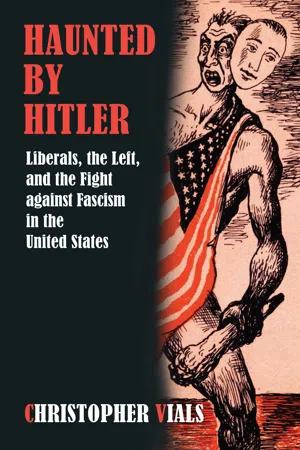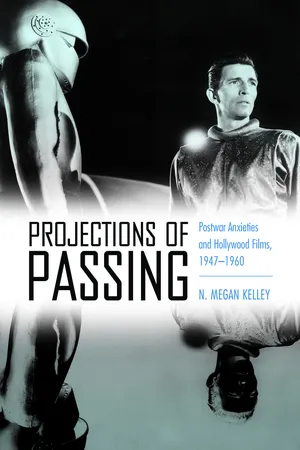History
House of Un American Activities Committee (HUAC)
The House Un-American Activities Committee (HUAC) was a congressional committee established in 1938 to investigate alleged disloyalty and subversive activities by individuals and organizations suspected of having communist ties. HUAC gained notoriety during the Cold War era for its aggressive investigations into Hollywood and the entertainment industry, leading to the blacklisting of many artists and professionals.
Written by Perlego with AI-assistance
Related key terms
Related key terms
1 of 4
Related key terms
1 of 3
11 Key excerpts on "House of Un American Activities Committee (HUAC)"
- eBook - ePub
The Safety of the Kingdom
Government Responses to Subversive Threats
- J. Michael Martinez(Author)
- 2015(Publication Date)
- Carrel Books(Publisher)
Chapter 7 THE HOUSE UN-AMERICAN ACTIVITIES COMMITTEE (HUAC) Until the day I die, I shall wonder how Whittaker Chambers got into my house to use my typewriter. —ALGER HISS, DECEMBER 15, 1948,EXPLAINING HOW A TYPEWRITER BELONGING TO HIS WIFE COULD HAVE BEEN USED TO PRODUCE INCRIMINATING DOCUMENTS 301T he House Un-American Activities Committee (HUAC) was an investigative committee of the US House of Representatives created in the 1930s to determine whether subversive forces threatened the welfare of the American republic. In 1945, the House voted to make HUAC a standing committee. Afterward, it reached the height of its infamy searching for evidence of Communist subversion in the aftermath of World War II.302When HUAC was created, the use of a congressional committee to investigate activities related to the health and welfare of the regime was nothing new. As early as 1792, the US House of Representatives established a committee to explore the circumstances surrounding a calamitous campaign against American Indians. As the decades passed, Congress created select committees to examine all manner of suspicious activities or suspected malfeasance. Armed with subpoena power and a broad grant of authority, investigative committees became important vehicles for ferreting out crucial information that might otherwise remain obscure. In the hands of overzealous investigators or opportunistic members of Congress, however, congressional committees sometimes abridged constitutional protections and exercised a chilling effect on citizens who sought only to speak the truth to power.303In the early years of the republic, congressional committees appeared to have few limitations on their authority until the US Supreme Court considered the matter in Kilbourn v. Thompson . In that 1880 case, a gentleman named Hallet Kilbourn was served with a subpoena duces tecum ordering him to appear, along with a series of documents, before a House committee investigating the bankruptcy of Jay Cooke & Company, an influential investment firm that filed for bankruptcy protection during the Panic of 1873. Kilbourn complied with the subpoena and appeared before the committee, but he refused to answer some questions and failed to produce the required documents. Held in contempt of the House, Kilbourn was placed into custody until he agreed to testify and tender the necessary documents. The much-aggrieved witness eventually filed suit for false imprisonment. The US Supreme Court subsequently reviewed the case and held that Congress possesses the power to punish contempt, but the crucial issue here concerned the authority of a congressional committee to exercise what appeared to be judicial authority. In the court’s view, Kilbourn had been improperly summoned before the committee and imprisoned for contempt. A congressional committee must not be convened for investigative purposes unless the committee acts in accordance with a reasonably well-defined legislative goal.304 - eBook - ePub
Elia Kazan
The Cinema of an American Outsider
- Brian Neve(Author)
- 2008(Publication Date)
- I.B. Tauris(Publisher)
3 Elia Kazan and the House Committee on Un-American ActivitiesThe House Committee on Un-American Activities (HUAC) was established in 1938 and became a Standing Committee of the House of Representatives in 1945. As was discussed in Chapter 1 , it was in October 1947 that the Committee held formal hearings in Washington on the film industry, providing a forum for various industry conservatives and some studio heads to testify as to what they saw as Communist influence on the industry. The refusal of the so-called ‘Hollywood Ten’ to answer questions on their Communist affiliations at these hearings led to their being cited for contempt of Congress by the House of Representatives. On the same day representatives of the major studios signed the Waldorf Declaration, pledging that they would not in future employ Communists. This essentially instituted a blacklist, although its full implementation would have to wait nearly three years until 1950 for the Supreme Court to decline to review an appeal on behalf of the Ten.1Senator Joseph McCarthy’s February 1950 speech in Wheeling, West Virginia – in which he began his campaign against Communists in the State Department – came in the immediate wake of the conviction of Alger Hiss, the former State Department official who had been accused by HUAC of passing secrets to a Communist spy ring and was now beginning a five-year sentence for perjury. To the cultural historian Richard Pells the conviction of Hiss ‘lent credence to the theory that all communists should be regarded as potential foreign agents’. Under the Internal Security Act, which became law in September 1950, Communist and Communist front organisations were required to register with the government, while the next year the Supreme Court upheld the convictions of the Communist Party leadership, further legitimating the FBI’s anti-Communist crusade.2 - eBook - ePub
Dalton Trumbo
Blacklisted Hollywood Radical
- Larry Ceplair, Christopher Trumbo(Authors)
- 2015(Publication Date)
- The University Press of Kentucky(Publisher)
9The 1947 Hearings of the Committee on Un-American ActivitiesWe called it “the committee.” We never capitalized it. We never called it HUAC or by any other initials. Other such committees, like the California one, we called by name—the Tenney Committee. “The committee” was reserved for the Feds.—Christopher TrumboOne of the great mysteries that confronts anyone who studies the history of the early domestic cold war is how the small- and narrow-minded members of the House Committee on Un-American Activities (1947–1951) succeeded in imposing their rigid and humiliating version of Americanism (nationalism cum patriotism) on the political culture of the United States.1 These men, not Senator Joseph McCarthy (R-Wis.), set the stage for official Cold War anticommunism. They did so by craftily melding together the power of a long-standing bogey (the Communist menace) and the virtually unchallengeable power of a congressional investigation (complete with subpoenas, the chairman’s gavel, and contempt citations). An even greater mystery is why a larger group with arguably loftier intellects and ideals (federal judges) gave their imprimatur to these show trials. Without the contempt convictions, the committee might have been a nuisance but not a name-, status-, and job-destroying juggernaut.On three previous occasions, 1938, 1940, and 1945, the chairman of the Special Committee on Un-American Activities had threatened to investigate Communists in Hollywood. Each time, nothing had transpired. But after the Republican sweep of the 1946 congressional elections, J. Parnell Thomas (R-N.J.), the new chairman of the now-permanent committee, launched an investigation into what he called the “Moscow-directed fifth column” in the United States.2 At the first hearing, held in March 1947, Eric Johnston, president of the producers’ associations, told the committee that Communists had completely failed to capture the movie industry and their propaganda never reached the screen. Several committee members openly scoffed at Johnston’s words,3 and it was soon announced that a three-person subcommittee would be coming to Los Angeles. The subcommittee arrived on May 8 to investigate composer Hanns Eisler (whose brother, Gerhart, was reputed to be the leading Soviet agent in the United States) and, in Thomas’s words, “to initiate an extensive and all-inclusive investigation of communistic activities and influences in the motion-picture industry.”4 The subcommittee held several closed-door hearings at the Biltmore Hotel, listening mainly to members of the Motion Picture Alliance, whom Thomas characterized as “friendly witnesses.”5 - eBook - ePub
J. Edgar Hoover Goes to the Movies
The FBI and the Origins of Hollywood's Cold War
- John Sbardellati(Author)
- 2012(Publication Date)
- Cornell University Press(Publisher)
5
THE 1947 HUAC TRIALS
I never as a citizen want to see our country become urged, by either fear or resentment of this group, that we ever compromise with any of our democratic principles through that fear or resentment. —Ronald Reagan, speaking before HUAC, October 1947The show began on Monday, October 20, 1947. Microphones and loudspeakers amplified the air, floodlights swung from the majestic chandeliers, and lawmen steered the crowd of hundreds eager to get a glimpse of Gary Cooper or Robert Montgomery. Such was the atmosphere as the House Committee on Un-American Activities ushered in its most publicized investigation to date with its hearings on Communist infiltration in Hollywood. “It has been launched with that ineffable touch of showmanship which the naïve Easterner associates with a Hollywood premiere,” the New York Times reported, “lacking only in orchids, evening dress and searchlights crisscrossing the evening sky.” HUAC reserved the largest available auditorium in D.C. for the event—the caucus room in the Old House Office Building—and welcomed coverage from the national press and major broadcasting networks. The committee hoped for a spectacle.1Chairman J. Parnell Thomas opened the hearings by recognizing the enormity of his committee’s undertaking. Hollywood represented one of the nation’s largest industries, its output consumed by eighty-five million Americans each week. This fact, so Thomas charged, necessitated HUAC’s investigation, for the movies held the power to shape American thought and culture. “With such vast influence over the lives of American citizens as the motion-picture industry exerts,” Thomas pleaded, “it is not unnatural—in fact it is very logical—that subversive and undemocratic forces should attempt to use this medium for un-American purposes.” Thomas claimed that the soured relations with the Soviet Union created an international system fraught with peril. Communists in the United States had long practiced their “boring from within” strategy, but the new Cold War made their endeavors all the more hazardous to national security. Thomas asserted that Soviet plans for world domination were made clear by the reopening of the Communist International. Communists in Hollywood, therefore, represented both an internal and external threat to the United States, the “chief target in what we might call the Soviet Union’s ideological war” against the West. No longer merely a domestic concern, the threat of Communism in Hollywood now struck a more dire chord, and HUAC’s investigation marked an opening salvo in the cultural cold war.2 - eBook - ePub
Hollywood and Anticommunism
HUAC and the Evolution of the Red Menace, 1935-1950
- John J. Gladchuk(Author)
- 2013(Publication Date)
- Routledge(Publisher)
35 The Committee achieved this “accomplishment” without having even produced a single thread of communist propaganda in film. The blacklist was the result, a plague that would haunt the industry for the better part of a decade. It was a genuine coup that proved integral to the extension of the un-American crusade and ultimately, to the evolution and expansion of McCarthyism.The efforts of the Ten and those that joined them in resisting the Committee did not, however, go in vain. Their progressive, resilient legacy, manifest in the film Salt of the Earth written and produced by former Ten member Herbert Biberman and fellow blacklistees Paul Jarrico and Michael Wilson, survived the HUAC-Hollywood rampage to inspire a new generation of determined “radicals.” Although many, such as Todd Gitlin, have argued that the student movement in the west was primarily a product of the Civil Rights movement in the South, it is clear that there were other motivating factors which contributed the rise of the student left in the late 1950’s.36 Opposition to House Committee on Un-American Activities was certainly one of those as many leftists at the University of California at Berkeley in the late 1950’s were children, or acquainted with children, whose parents had been directly affected by the HUAC purge. SLATE, the 1950’s left-wing organization that arguably erected the “antiestablishment” framework essential to the emergence of the more heralded Free Speech Movement (FSM) of the early 1960’s, provided a “soapbox” for many “red diaper babies” opposed to ultraconservatism.37 Moderately radical in orientation, SLATE (a name attributed to a “slate” of progressive candidates running for Berkeley student government in 1957) in the end operated in the name of civic and economic equality well in advance of both the Free Speech Movement and its Midwestern sister organization, Students for a Democratic Society (SDS). “SLATE,” as acknowledged by historian W.J. Rorabaugh, “was the first post-McCarthy era organization to reject anticommunism [as it] established a working model for later Berkeley umbrella groups.”38 - eBook - ePub
The Subversive Screen
Communist Influence in Hollywood's Golden Age
- Brian E. Birdnow(Author)
- 2019(Publication Date)
- Praeger(Publisher)
CHAPTER SIX The HUAC HearingsAfter the preliminary skirmishes of May 1947, Congressman J. Parnell Thomas announced that he would hold public hearings on communist infiltration of the motion picture industry in Washington, D.C. during the second week of October. The House Committee on Un-American Activities, known, as we have stated, as HUAC, issued forty-three subpoenas, twenty-four of them to a group known as the “friendly witnesses.” These were Hollywood figures who had expressed guarded support for the inquiry, and, in fact, some of them had testified at the earlier closed executive sessions in Los Angeles in May. The remaining nineteen individuals on the subpoena list, eleven of whom were called to testify, had publicly denounced the hearings and had let it be known that they planned not to cooperate. Consequently, they were known as the “unfriendly witnesses.”The nineteen witnesses deemed the “unfriendlies” had been classified as likely communists by the Motion Picture Alliance for the Preservation of American Ideals, a relatively new organization of politically conservative members of the film community. The rather unwieldy name of the organization led to people referring to this group by the acronym MPA, short for Motion Picture Alliance. The list of “unfriendly witnesses” consisted of Alvah Bessie, Herbert Biberman, Bertolt Brecht, Lester Cole, Richard Collins, Edward Dmytryk, Gordon Kahn, Howard Koch, Ring Lardner, Jr., John Howard Lawson, Albert Maltz, Lewis Milestone, Samuel Ornitz, Larry Parks, Irving Pichel, Robert Rossen, Waldo Salt, Adrian Scott, and Dalton Trumbo. The “Nineteen Unfriendlies,” along with their attorneys, now had to formulate a defense strategy.1While most observers waited for the next move in this complex minuet, official Hollywood began to choose sides. In the late summer of 1947, party organizer Harold Salemson claimed that the battle lines were forming among the Hollywood elite. He pointed out that a party splinter group, the Progressive Citizens of America, included John Garfield, Lena Horne, Edward G. Robinson, Anne Revere, Gene Kelly, Paul Henreid, Betty Garrett, Katharine Hepburn, Paul Draper, Howard Da Silva, Lee J. Cobb, Gregory Peck, and others. He also mentioned a so-called “Republican” group, which included Ginger Rogers, Robert Montgomery, Adolphe Menjou, George Murphy, Walt Disney, screenwriter Morrie Ryskind, and director-producer Leo McCarey, as closely following the developments, although coming at things via different routes.2 - eBook - ePub
Screen Classics
The Life and Films of Hollywood's Most Celebrated Director
- Gabriel Miller(Author)
- 2013(Publication Date)
- The University Press of Kentucky(Publisher)
14
The House Un-American Activities Committee
Detective Story (1951), Roman Holiday (1953), The Desperate Hours (1955), The Children's Hour (1961)In September 1947, J. Parnell Thomas, a Republican congressman from New Jersey, reconvened the House Un-American Activities Committee (HUAC) to investigate “alleged subversive influence on motion pictures.” More than forty people from the film industry received subpoenas to appear before the committee. There were two groups of witnesses. One—termed “friendly” by the committee—was made up of individuals willing to name fellow workers whom they thought to be members of the Communist Party and to identify moments in films that contained communist propaganda. The second group—labeled “unfriendly”—consisted of nineteen actors, writers, producers, and directors who became, in effect, the defendants. Of these nineteen, only eleven were called to testify. One of the eleven, German playwright Bertolt Brecht, denied membership in the Communist Party and promptly left the country. The others, who became known as the “Hollywood Ten,” were eventually tried, fined, and imprisoned for contempt of Congress.Shortly after the announcement that the HUAC would hold its first hearings in October 1947, Wyler and his friends John Huston, Philip Dunne, and Canadian actor Alexander Knox met to form a group in opposition to the hearings. At first, they called their campaign Hollywood Fights Back, but they later changed the name to the Committee for the First Amendment (CFA). The CFA gathered at Ira Gershwin's home—along with a group of Hollywood stars that included Edward G. Robinson, Danny Kaye, Humphrey Bogart, Lauren Bacall, Burt Lancaster, Gregory Peck, Myrna Loy, Ava Gardner, Henry Fonda, and Gene Kelly—and prepared a statement that ran a few days later in newspapers across the country and was also presented to Congress in the form of a petition. An early version of the petition, which was signed by David Selznick, John Ford, Bette Davis, George Stevens, and Frank Capra, among others, read in part: - eBook - ePub
Legislative Deliberative Democracy
Debating Acts Restricting Freedom of Speech during War
- Avichai Levit(Author)
- 2020(Publication Date)
- Routledge(Publisher)
20On April 30, 1948, the HUAC recommended passage of a newly redrafted bill (the Mundt-Nixon bill, introduced in the House by Representative Mundt), which incorporated suggestions brought up in the subcommittee hearings.21 For example, it provided for administrative determinations, that is, enabled the attorney general to institute investigations to determine whether an organization is a communist political organization or a communist front organization (and provided that any organization may obtain judicial review of an order of the attorney general to register),22 and it had an entire section on the necessity for legislation that contained the findings of Congress.23Other sections were added as a result of the subcommittee hearings, including: making it unlawful to attempt, or facilitate, the establishment of a totalitarian dictatorship in the United States under foreign control (i.e., not just communist);24 requiring that the registration with the attorney general of communist political organizations and communist front organizations be accompanied with a statement and names and addresses of their officers and an accounting of receipts and expenditures (thus forcing the Communist movement, in view of its foreign-directed character, to operate in the open rather than underground);25 denying passports to members of communist political organizations (a means to fight the international communist conspiracy);26 denying federal employment to members of communist political organizations (to protect the integrity of government itself);27 and making it unlawful for registered communist organizations to broadcast any matter over the radio unless it is proceeded by a statement giving the name of the organization and the fact that it is communist.28 - eBook - ePub
Charlie Chaplin
A Political Biography from Victorian Britain to Modern America
- Richard Carr(Author)
- 2017(Publication Date)
- Routledge(Publisher)
You have voiced the thoughts of millions of Americans who love this country dearly and who object strenuously to every type of “Fifth Column” activity’. 20 This was symptomatic of a growing divide between liberal and conservative Hollywood concerning the activities of Dies. In August 1938 HUAC investigator Edward F. Sullivan suggested that ‘evidence tends to show that all phases of radical and communist activities are rampant amongst the studios of Hollywood and, although well known, is a matter which the movie moguls desire to keep from the public’. 21 He continued that he might say in passing that a very large number of motion picture stars are strongly opposed to all this subversive activity but, as one very prominent star told me, if he spoke loud about the situation, he would soon be ditched by the studios and a campaign of vilification would be started against him. 22 There was some irony in the right complaining about ill-treatment here. For one, on the liberal side of the movie industry stood the Hollywood Anti-Nazi League, formed in April 1936, that contained some 5,000 mostly left-leaning actors and motion-picture employees, including Edward G. Robinson and Melvyn Douglas. In investigator Sullivan’s terms, this organisation was itself subject to a large degree of vilification. In the late 1930s Sullivan’s HUAC colleague John Metcalfe brought another poster into the hearings that stated that ‘the Jewish Hollywood Anti-Nazi League controls communism in the motion picture industry – stars, writers, and artists are compelled to pay for communistic activities’ - eBook - ePub
Haunted by Hitler
Liberals, the Left, and the Fight against Fascism in the United States
- Christopher Vials(Author)
- 2017(Publication Date)
- University of Massachusetts Press(Publisher)
The senator did not originate the phenomenon which came to bear his name, McCarthyism, but when he started to fall, the whole edifice of domestic anticommunist repression began to crack. Its postwar incarnation began in earnest with the resumption of the House Committee on Un-American Activities (HUAC) in 1946 and its hearings on the Hollywood Ten in 1947; with Truman’s purge of suspected communists from federal agencies and the establishment of a List of Subversive Organizations by his attorney general in 1947; and with the American Business Consultants’ publication Red Channels in 1950, a reference guide used by radio, television, and film executives to blacklist individuals suspected of communist affiliation. McCarthy, whose plebeian, tough-guy persona made him a seminal figure in the emergence of right-wing populism in the United States, came to personify this wave of political reaction. 3 And as a number of scholars have noted, the wave he rode was not so much one of repression of communism as of any challenge to the Cold War consensus and entrenched power. 4 Over the course of his wild, devastating four years of power, begun in 1950, he used his position as chair of the Senate Internal Security Subcommittee (SISS) to hunt down domestic Communists and in so doing turned a range of social institutions upside down, including the State Department, labor unions, the culture industries, the university system, and the military. McCarthy had always been a controversial, polarizing figure, one who had more critics than fans. 5 Liberals chafed under his accusations of treason, establishment figures like the U.S. diplomat George Kennan, the publisher Henry Luce, and Dwight Eisenhower eventually saw him as compromising the legitimate fight against communism, and the left justifiably felt that his unchecked power threatened its very existence. His probe of the U.S - eBook - ePub
Projections of Passing
Postwar Anxieties and Hollywood Films, 1947-1960
- N. Megan Kelley(Author)
- 2016(Publication Date)
- University Press of Mississippi(Publisher)
Once a person had been investigated, his or her options were limited. The political and legal atmosphere allowed little room for self-defense. Many HUAC witnesses took the Fifth Amendment, which the committee cited as proof of something to hide and which proved equally inadequate as a defense. Fighting charges of subversion was difficult under legal rulings that allowed courts and government committees to use Constitutional defenses as proof of guilt because innocent people would not resort to those tactics. For unfriendly witnesses, there was no safe defense.In 1954, journalist James Wechsler admitted to the House Committee on Un-American Activities that he had been a member of the Communist party while an adolescent in the 1930s, adding that he had become an ardent anti-Communist and that this shift earned him abuse from former comrades.20 This narrative of youthful folly did not satisfy McCarthy. “How do we know,” the Senator asked, “that you didn’t quit them on Moscow’s order?”21 Those suspected of Communist ties were damned: if they stayed within the party, they were Communist; if they left the party they could still be viewed as dangerous subversives, who were only passing as loyal Americans. There was simply no way for Wechsler to prove to McCarthy he was a patriotic citizen.The attitude of anti-Communist crusaders was summed up by Lela Rogers, mother of dancer Ginger Rogers. She wanted legislation to “preserve the Bill of Rights to the people for whom it was designed—that precious Bill was never intended to protect enemy agents, saboteurs, and spies whether they’re American or alien born.”22 Following a similar logic, in the pro-HUAC film Big Jim McClain (1952), the hero explains how “only subversives hostile to legitimate authority would hide behind Constitutional niceties,” adding that “a democratic society should not misinterpret the Bill of Rights as a suicide pact.”23While anti-Communists fought against liberty in the name of national security, important figures like Albert Einstein attacked the right of HUAC to conduct their investigations. In 1953 he released a statement, entreating: “every intellectual who is called before one of the committees ought to refuse to testify . . . [because] it is shameful for a blameless citizen to submit to such an inquisition and that this kind of inquisition violates the spirit of the Constitution.”24
Index pages curate the most relevant extracts from our library of academic textbooks. They’ve been created using an in-house natural language model (NLM), each adding context and meaning to key research topics.
Explore more topic indexes
Explore more topic indexes
1 of 6
Explore more topic indexes
1 of 4
